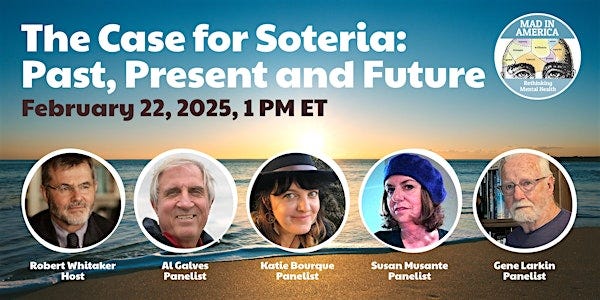Soteria House
I often wonder how my first experience could have been different. Could I have avoided the trauma and negative story shaped by the biomedical model that weighed me down for much of my life? Could I have avoided the learned anxiety that followed the traumatic aftermath of forced hospitalization, alongside the dark narrative perpetuated by a culture and psychiatric model that views these experiences as a dangerous life long disease?
It took most of my adult life to learn how to recognize and care for these challenging gifts. But could I have figured this out from the beginning? At the start, all I had was the biomedical model and the panic of the adults around me. There is a clear distinction in my mind between my initial experience and the trauma that stemmed from my first care and interactions with the system in place. No one suggested I had a gift that needed a special kind of care to bring it forth as a strength in my life. I was scared, alone, vulnerable, and desperately needed someone to explain what was happening.
I needed a safe space to navigate the process that had just begun. I needed peers who shared similar lived experiences, a place to escape the toxic environment of my home life as I adjusted to this new way of seeing myself and the world. I needed a space that offered alternative perspectives to the biomedical model—not to dismiss it entirely, but to focus on the possibility of transformation through experience, without relying on medication.
All I was told was that I had a dangerous disease and needed medication to live a "normal" life. Normal life? No thanks, if that means conforming to the standards defined by the Diagnostic and Statistical Manual of Mental Disorders.
Soteria House is one such place to explore other ways of approaching these changes. In Greek mythology, Soteria was the goddess of safety, preservation, and deliverance from harm. Soteria House is a drug-free, home-like alternative to acute psychiatric hospitalization. It’s a treatment approach focused on creating calm, listening to voices and visions as possible guides, and promoting self-care. It's a communal setting where you meet others with similar lived experiences.
When methods like this, along with the Open Dialogue approach, are used initially, research shows that the need for medication is significantly reduced. Many people move through their experiences transformed and healed. Or they figure out how to live with their voices and visions as allies and guides. Just knowing that the recovery model exists makes recovery more likely—contrasting sharply with the biomedical model, which often leaves no room for recovery. But the speed at which the biomedical model jumps to extreme measures severely limits the possibility of this kind of transformation.
It just makes sense and you wonder why there is only one such house in the USA. The pharmaceutical industry and its close ties with psychiatry create significant barriers. Profit margins rarely align with improving mental well-being, and Big Pharma, with all its wealth, has a strong influence over which studies get funded. There's little incentive to explore non-medical approaches with profits being most important. Capitalism, in the end, is detrimental to our mental health, and the situation is only going to get worse within the current climate. This makes it even more critical to focus on alternative solutions, both as individuals and communities, and to shift the cultural narrative about how we approach those in our lives experiencing mental health struggles. Soteria House and its model are proven examples of this kind of positive change.
The creative and visionary potential within these experiences is well documented. I like to imagine a generation of people being treated through these alternative methods and the profound contributions they could make to the change our world desperately needs. A collective spiritual awakening through those once labeled as outcasts and a threat to the normal being defined by the powers that be. It sounds like revolution to me!
If you're interested in learning more, check out this upcoming webinar from Mad in America entitled The Case For Soteria: Past, Present, and Future.
https://www.eventbrite.com/e/the-case-for-soteria-past-present-and-future-tickets-1116835006569?aff=MIAwebsite



